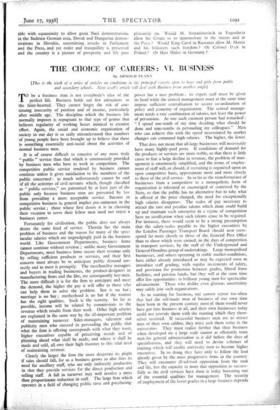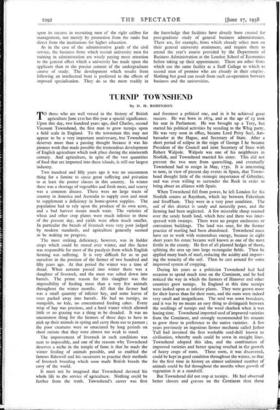THE CHOICE OF CAREERS : VI. BUSINESS
By ARNOLD PLANT
[This is the sixth of a series of articles on conditions in the principal careers open to boys and girls from public and secondary schools. Next week's article will deal with Business from another angle] TO be a business man is not everybody's idea of the perfect life. Business holds out few attractions to the faint-hearted. They cannot forget the risk of con- tinuing insecurity of position and of income, particularly after middle age. The discipline which the business life normally imposes is repugnant to that type of genius that believes regularity of working hours inimical to creative effort. Again, the social and economic organisation of society in our day is so sadly misunderstood that numbers of young people have been brought up to believe that there is something essentially anti-social about the activities of normal business men.
It is of course difficult to conceive of any more truly " public " service than that which is continuously provided by business men who have to work in competition. The competitive public service rendered by business cannot continue unless it gives satisfaction to the members of the public concerned : as much unfortunately cannot be said of all the activities of civil servants which, though classified as " public services," are patronised by at least part of the public only because business men are prevented by law from providing a more acceptable service. Success in competitive business in general implies pre-eminence in the public service ; those whose first desire it is in choosing their vocation to serve their fellow men need not reject a business career.
Fortunately for civilisation, the public does not always desire the same kind of service. Therein lies the main problem of business and the reason for many of the spec- tacular salaries which are ungrudgingly paid in the business world. Like Government Departments, business firms cannot continue without revenue ; unlike many Government Departments, most business firms secure their revenue only by selling sufficient products or services, and their first concern must always be to anticipate public demand cor- rectly and to meet it promptly. The merchandise managers and buyers in trading businesses, the product-designers in manufacturing firms and the like, are consequently key-men. The more difficult it is for the firm to anticipate and meet the demand, the higher the pay it will offer to those who can help them to solve the problem. Sex is no bar ; marriage is no bar ; motherhood is no bar if the woman has the right qualities. Such is the scarcity. So far as possible, income will be related by commissions to the revenue which results from their work. Other high salaries are explained in the same way by the all-important problem of maintaining turnover. Sales-managers, salesmen and publicity men who succeed in persuading the public that what the firm is offering corresponds with what they want, higher executives capable of perceiving trends and of planning ahead what shall be made, and where it shall be made and sold, all owe their high incomes to this vital need of maintaining revenue.
Clearly the larger the firm the more desperate its plight if sales should fall, for as a business grows so also does its need for ancillary staff, who are only indirectly productive in that they provide services for the direct production and selling staff. A fall in turnover may well involve a more than proportionate reduction in staff. The large firm which operates in a field of changing public taste and purchasing- power has a nice problem ; its expert staff must be given its head while the central management must at the same time impose sufficient centralisation to secure co-ordination of policy and economy of organisation. The central manage- ment needs a rare combination of talents, not least the power of persuasion. As one such eminent person had remarked : " I spend one-tenth of my time deciding what should be done and nine-tenths in persuading my colleagues." Men who can achieve this with the speed necessitated by market changes can command high salaries. The higher, the fewer.
That does not mean that all large businesses will necessarily have many highly-paid posts. If conditions of demand for the products or services are more stable, so that there is little cause to fear a large decline in revenue, the problem of man-. agement is enormously simplified, and the terms of employ- ment of staff will, or should, if recruiting is organised upon an open competitive basis, approximate more and more closely to those of the civil service. In so far as the transformation of businesses from a competitive to a monopolistic form of organisation is tolerated or encouraged or contrived by the State, so that the public has no alternative but to take what is offered at the price charged, the need for exceptionally high salaries disappears. The scales of pay necessary to attract the rare and peculiar talents which alone could build up and maintain such enterprise in a regime of competition have no justification when such talents cease to be required. For instance, there would seem to be a strong presumption that the salary-scales payable to the higher executives by the London Passenger Transport Board should now corre- spond far more closely to those of the General Post Office than to those which were earned, in the days of competition in transport services, by the staff of the Underground and General Omnibus group of undertakings. Large monopolised businesses, and others operating in stable market-conditions, have either already introduced or may be expected soon to introduce staff grading, with regular increments of salary, and provision for promotion between grades, liberal leave facilities, and pension funds, but they will at the same time offer few opportunities to brilliant young men for spectacular advancement. Those who dislike even glorious uncertainty may safely join such organisations.
As to training for business, one cannot repeat too often that had the self-made men of business of our own time been born in the present century most of them would never have got into business at all, and their own businesses today could not provide them with the training which they them- selves received. If successful business men are to attract men of their own calibre, they must seek them today in the universities. They must realise further that their business when developed on a large scale cannot as efficiently train men for general administration as it did before the days of specialisation, and they will need to devise schemes of training which will enable university men to become higher executives. In so doing they have only to follow the lead already given by the most progressive firms in the country. They will encounter ill-advised opposition from the rank and file, but the capacity to meet that opposition as success- fully as the civil services have done is today becoming one of the essential qualities for management. The security of employment of the lower grades in a large business depends upon its success in recruiting men of the right calibre for management, not merely by promotion from the ranks but direct from the institutions for higher education.
As in the case of the administrative grade of the civil service, the business firms which recruit university men for training in administration are wisely paying more attention to the general effect which a university has made upon the applicant than to the precise content of the undergraduate course of study. The development which results from following an intellectual bent is preferred to the effects of imposed specialisation. They do so the more readily in the knowledge that facilities have already been created for post-graduate study of general business administration. There are, for example, firms which already select men on their general university attainment, and require them to attend the year's course provided by the Department of Business Administration at the London School of Economics before taking up their appointment. There are other firms which use the same facility as a Staff College to which to second men of promise who are already in their employ. Nothing but good can result from such co-operation between business and the universities.



















































 Previous page
Previous page